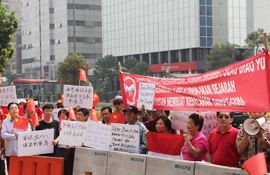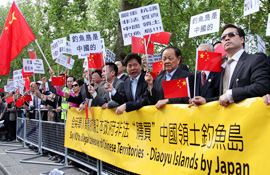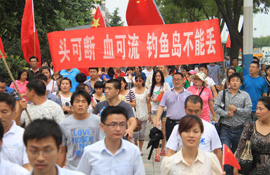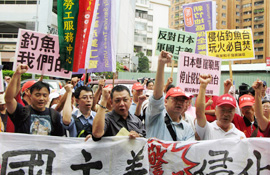|
 |
 |
|
JAKARTA IRE: Overseas Chinese demonstrate in front of the Japanese Embassy in Indonesia on September 18 (GU SHIHONG) |
LONDON RAGE: Overseas Chinese hold a demonstration in front of the Japanese Embassy in Britain on September 18 (ZHOU ZHAOJUN) |
 |
 |
|
VOICES IN BEIJING: Demonstrators march in protest of Japan's "purchase" of the Diaoyu Islands in front of the Japanese Embassy in China on September 14 (CFP) |
PROTESTS IN TAIWAN: Protesters gather in front of the Taipei Office of the Interchange Association, Japan, on September 12, demonstrating against Japan's illegal "purchase" of the Diaoyu Islands (HUANG SHAOHUA) |
Jin pointed out that Japan's recent actions were aimed at strengthening actual control over the Diaoyu Islands and shifting domestic focus from a poor economy to territorial disputes. He said that besides right-wing agitation and the weak government in Japan, the United States is an important source of current tensions between China and Japan.
Although the United States declared it doesn't have a position on the Diaoyu Islands issue, its underlying bias has encouraged Japan's ambition. U.S. Secretary of Defense Leon Panetta paid a visit to East Asia recently, during which he told Chinese Defense Minister Liang Guanglie that maritime issues should be resolved via peaceful diplomatic means. However, during his Japan visit earlier, Panetta discussed with his Japanese counterpart Satoshi Morimoto the deployment of the Osprey aircraft at a U.S. Marine Corps base in Okinawa, a plan that has provoked strong local opposition.
Panetta also announced that the United States and Japan had agreed to locate the second U.S. missile defense radar in Japan to monitor possible threats from the Democratic People's Republic of Korea. Although the United States claims the missile defense is not directed at China, a military boost from the United States at such a sensitive moment could embolden Japan to take a tougher stance in its disputes with China.
Chinese experts pointed out that due to its East Asia strategy, Washington actually prefers tension or even a conflict between China and Japan. They criticized the biased stance of the United States as unhelpful to the regional situation, warning that Washington is playing a dangerous game.
Jin explained Washington's strategic targets. One is to create tension in the region to find an excuse for its strategic focus in East Asia; the other is to further control Japan, making the latter its base in the region.
Shi Yongming from the CIIS believed the United States is trying to stoke tension between China and Japan to diminish the growing influence of regional integration. In recent years, China, Japan and South Korea have jointly made efforts to establish a free trade area. The three countries make up about 22 percent of the global population; their combined economies account for 19 percent of the world total; meanwhile, their foreign exchange reserves account for 47 percent of the total worldwide. It would be the third largest free trade area in terms of total GDP next to that of the EU and North America. "U.S. stance on the Diaoyu Islands is creating divisions between the two East Asian nations by political and economic methods," concluded Shi.
However, Jin warned that Washington may be overconfident on this issue. A game involving territorial disputes is too dangerous. The United States cannot always control the supposed balance it promotes between China and Japan, both being influential countries in the world, Jin added.
Japan's reckless actions sparked the indignation of Chinese people and damaged the bilateral relationship of the past 40 years. China took a series of countermeasures to express its determination to protect its sovereignty and territorial integrity. It urged Japan to make rational moves to restore regional stability.
Air defense sirens sounded at 9:18 a.m. on September 18 in Shenyang, capital of northeast China's Liaoning Province, kicking off nationwide activities marking the 81st anniversary of Japanese invasion. After Japan declared its plan to "purchase" the Diaoyu Islands, Chinese people spontaneously held protests and demonstrations throughout the country.
| 